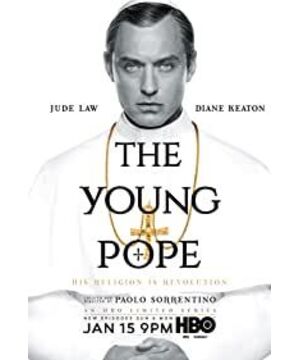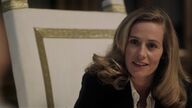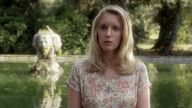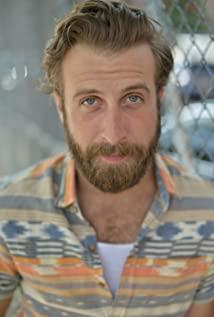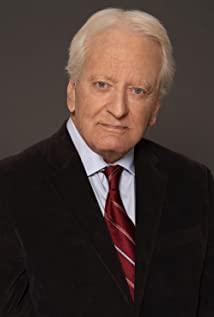And more importantly, the Pope meets people at St. Peter's Square every Sunday at 12 noon. This happens to be the time I came out of the museum after visiting the museum, so I was very lucky to see this old man with white beard.
The only unfortunate thing is... this old man speaks Italian, and I didn't understand a word.
This experience left a deep shadow on me, and I watched this TV show until today.
Because we finally have an English-speaking pope.
Before watching this TV series, the Vatican-themed work that impressed me the most was Nanni Moretti's "The Birth of the Pope". And the two are quite similar in setting: the directors are all Italians; the protagonists are the newly appointed popes; and they are all pushed to this position by others, in other words, they are all victims of political games.
In "The Birth of the Pope", the Vatican is an out-and-out vanity fair. Everyone wears a mask and speaks beautiful things that no one believes in sincerely. Religion seems to be just a wreath of whitewashing power. Therefore, the seemingly supreme position of the Pope has turned into a hot potato-smart people know that standing in the dark can win more benefits for themselves.
The newly appointed pope panicked like a little boy. He first escaped in the most important first balcony speech, and then even ran away from home and disappeared in Rome. When he was young, his dream was to be an actor. Compared with his own life trajectory, his ambition seemed really outrageous.
But now he discovered that, under the aura of the Pope, he finally became an actor.
In the past few years, more and more film directors are entering the small screen, so overnight, all TV dramas are proud of being "exquisite as if they are making a movie."
The reason behind this is actually not difficult to understand. Although short stories are exquisite and subtle, they are always novels that you will never forget, and there is nothing wrong with moving this truth to the screen. TV dramas give directors more creative freedom, allowing them to describe a character more deeply and dig a story. Short stories can make you stop abruptly at the climax, but only the group of sentient beings is the real epic.
There are so many things that can't be finished in 120 minutes, and "The Young Pope" is a perfect example.
As soon as the first episode came up, Lenny, who was a new official, gave a very ironic and subversive speech. He first said some high-sounding clichés, and all the church members on St. Peter's Square were grateful and extremely religious.
Suddenly he changed his style and said: "Did you forget self-reading, abortion, homosexuality?"
Everyone was stupid, and he raised his arms and shouted, full of American freedom and democracy, as if he was possessed by the Statue of Liberty.
Then Lenny woke up from a nightmare sweating profusely.
It turns out that none of this is true.
In the first two episodes of this TV series, the director cleverly set up several sets like this for the audience to drill in.
So some people think that this is an extended version of "The Birth of the Pope", a rebellious and fashionable young pope, symbolizing the new forces of freedom, democracy and the United States, and deeply criticizing his corrupt and hypocritical Italian colleagues. Some people think that this TV series is "The Vatican version of "House of Cards"", a history of the puppet pope's upper court.
Then you underestimate Sorrentino, his ambition is obviously not limited to this. It is even said that he happened to do the opposite.
If most of the TV series are not just "The Pope" or "House of Cards", their purpose is to deconstruct, to turn "gods" into "people", to make the pope, cardinal, president, and everything look distant. Not to be able to walk down the altar of the uppermost people.
So "The Young Pope" obviously put religion back into that mysterious, dark shrine.
His purpose is to recreate a god.
Power struggles, religion, human nature and freedom, these themes will make a TV series very "good-looking", but they will not make them beyond this category.
Just like our young Pope Lenny, he is really a controversial person. For breakfast, I only drink a bottle of cherry-flavored Coke Zero, smoke every day, read Salinger’s novels, watch Kubrick’s movies, and believe that Kubrick is the most important American director rather than Spielberg.
(Spielberg fans pay attention)
What a charm.
But none of these will make him a great person, nor will he make him a pope.
Because to become the Pope, there is only one condition.
Belief.
Lenny is like a god. He is a statesman, a tyrant, and a saint.
In front of him, the cardinals who claim to be politicians and play power all their lives are almost vulnerable. No matter how many moves they make, they will be beaten back lightly by him. This is not only because he has a better political skill, but more importantly, he really has no weaknesses. He was really strict with himself, he really lived the life of a Puritan, and he could really resist all substantive temptations.
And what is his enemy?
It is not a group of old men who blow their beards and stare every day and covet the position of the pope; but his billion people are everyone who only seeks comfort but is unwilling to give, only wants happiness but rejects pain.
It’s everyone who has been condoned by so-called liberalism for too long, who was hit by a severely worded speech to convert their beliefs, thinking that they had traveled far and wide to buy a plane ticket to Rome and squeeze in St. Peter’s Square with thousands of people. It is a great pilgrimage, and one rain shower is enough to touch people who touch themselves and God.
Under the appearance of cynicism, he is so serious and conservative that he has been questioned countless times, as if what he wanted to give the congregation was not forgiveness, but punishment; not love, but pain.
What he wants is 100% faith, the most fanatical love, the most loyal believer. Other than that, it's nothing.
And he certainly deserves such love and dedication. Because he faced everyone's suspicions and blows, he never gave in.
This is the most precious part of this TV series. To appreciate this work, you don't need to be a congregation, or even have any knowledge of Catholicism or the Vatican. Because this young pope is a true idealist. He tried to use the power of one person to change the entire church and fight against the beliefs of the world.
"I love the Lord because loving mortals is so painful."
"God is in your eyes."
———————————————————————— ——————————————
(with spoilers) The
above is written after I watched the first five episodes. (And it was posted in the Taotaotao movie)
But if the first five episodes are katana, the last five episodes are obviously roses.
The structure of this TV series is very clear. The fifth episode was a small climax. Lenny finally got the surrender of all the cardinals, although most of this surrender came from "shock" rather than from the heart. Starting from the sixth episode, it is a new beginning. I personally think that the rhythm of episodes six and seven is a bit slow, but this kind of foreshadowing is probably unnecessary. From the eighth episode, every minute is so exciting that I don't want to blink my eyes.
If the first half is a process of creating a god, then the second half is to wipe off the flaws on his crown one by one. He was pushed to an unprecedented height, he was not only a god, but also a father.
In the process, Lenny became more like a person. Some of his previous views that were too harsh have softened his attitudes towards homosexuality, abortion, and the congregation. He learned to laugh and to cry.
It turns out that he is not a tyrant at all. His coldness only stems from his doubts about himself, this is a middle-aged crisis for believers.
In essence, he was a gentle person. God loves the world, so he also loves the world. Lanny, who knows how to give love, finally won the respect and approval of everyone, and he became the true pope.
Unfortunately, this TV series starts with "Tyrant" and ends with "Love". In the end, our protagonist is still a saint, and his holiness and compassion are undisputed.
To some extent, Sorrentino killed some of the "possibility" he created in the first five episodes. But from another perspective, love should be the answer to everything, because people cannot live in nothingness forever.
And after going through this process from negation to affirmation, perhaps we can better understand what "the world will never understand, how much truth there is in clichés". ——Just as all the past popes gathered at Lenny's table and told him that power is a cliché. And love is also a cliché.
Fortunately, this TV series did not end in the ninth episode-Lenny's gentle and affectionate letters are like a breeze, gently blowing across everyone's face in this drama, as if all beings are bathed in his love.
On the contrary, in the last ten minutes of the show, Lenny finally appeared to the public as we expected and gave an impeccable speech. Just when everything could end perfectly, he found a non-smiling person among the smiling crowd. He didn't have time to track down the other person's figure, so he fell to the ground.
This is finally not a perfect ceremony.
But such an unexpected, such an undercurrent hidden in the light, which never dissipates, may be the unique value of this work.
View more about The Young Pope reviews


